Filter by...
Reset all
Publications (8894)
Book Chapter
– The Playing out of Aid Nurtured Ideals in Rwanda and Cambodia
From the book:
Fragile Aid
Book Chapter
From the book:
Fragile Aid
Book Chapter
From the book:
Fragile Aid
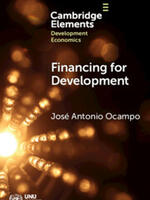
– The Global Agenda
The reform of the international financial and tax systems has been at the center of global debates in recent years—in the United Nations, the World Bank, the International Monetary Fund, the OECD and the G20. The fourth United Nations Conference on Financing for Development that will take place in...
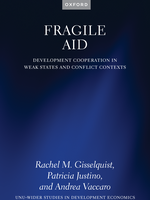
– Development Cooperation in Weak States and Conflict Contexts
ESTIMATED FOR OPEN ACCESS ONLINE PUBLICATION ON 3 APRIL 2025 | An important question for the future of aid concerns its role in weak states and conflict contexts. While considerable research points to a mixed record of effectiveness in these contexts, the imperative of external support for...

O Programa Subsídio Social Básico (PSSB) é o maior programa de assistência social em Moçambique, abrangendo mais de 600.000 beneficiários e com um orçamento anual de aproximadamente 100 milhões de dólares —equivalente a cerca de 1% da despesa total do estado em 2022.Cobertura desigual: O PSSB-Idoso...

The Basic Social Subsidy Programme (PSSB) is the largest publicly administered social assistance programme in Mozambique, covering more than 600,000 beneficiaries with an annual budget of approximately USD 50 million—equivalent to around 1% of total government expenditure in 2022.Uneven coverage...

Este relatório apresenta os resultados de uma avaliação quantitativa do impacto da componente para idosos do Programa de Subsídio Social Básico (PSSB) de Moçambique no bem-estar dos beneficiários. Ao fazê-lo, o relatório dá resposta a um pedido feito pelo Ministério do Género, Criança e Acção Social...

This report presents results of a quantitative evaluation of the impact of the elderly component of Mozambique’s Basic Social Subsidy Programme (PSSB) on beneficiaries’ well-being. In doing so, the report responds to a request made by the Mozambican Ministry of Gender, Children, and Social Action...
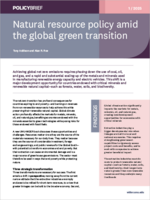
Achieving global net zero emissions requires phasing down the use of coal, oil, and gas, and a rapid and substantial scaling-up of the metals and minerals used in manufacturing renewable energy capacity and electric vehicles. This shift is a major development opportunity for countries endowed with...

With just days to go before the rescheduled 2025 Budget Speech, South Africa faces a ZAR 60 billion revenue shortfall amid slowing economic growth and diminishing international aid. The initial proposal to increase VAT from 15% to 17% met sharp opposition, prompting an unprecedented postponement...

The 2024 WIDER Annual Report details the institute's efforts in addressing global challenges through robust economic research. The report highlights UNU-WIDER’s contributions in areas like inequality, conflict resolution, and fiscal policy. It features key projects and initiatives, such as the...

In an increasingly interconnected world, economic instability, conflict, and inequality pose significant challenges. Concerns about such instability and limited solutions from academia in the early 1980s spurred the establishment of UNU-WIDER. This piece explores the foundational years of UNU-WIDER...
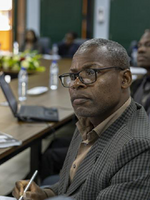
In today’s rapidly changing economic landscape, the importance of evidence-based policymaking cannot be overstated. Across Africa, countries face challenges related to limited access to reliable data and insufficient analytical capacities, hindering efforts to drive economic growth and tackle issues...

With less than five years remaining to meet the United Nations Sustainable Development Goals (SDGs), UNU-WIDER continues to increase available knowledge on how to combine national policy initiatives, global cooperation, and research results to achieve progress. In 2024, UNU-WIDER began a new work...

The 1995 Beijing Declaration and Platform for Action set ambitious goals for equality, development, and peace for women worldwide. Endorsed by 189 countries, it reaffirmed that women’s rights are human rights and called for their full recognition and protection at every stage of life. Nearly 30...
Working Paper
pdf
– Evidence from India’s Annual Periodic Labour Force Surveys
We provide annual estimates of inequality in monthly per capita household earnings in India over the period 2017/18 to 2022/23 based on analysis of India’s Periodic Labour Force Surveys. Over the six years, the estimate of inequality as measured by the Gini coefficient is in the range of 0.40 to 0...
Working Paper
pdf
The international financial architecture is misaligned with the goals set out in the UN Sustainable Development Goals and the Paris climate agreement. External financing flows to emerging-market and developing countries (excluding China) need be increasing by at least US$1 trillion annually from...
Working Paper
pdf
– Mexico and United States compared
Building upon a multisectoral framework in light of the Kuznetsian paradigm, this paper analyses the relationship between structural transformation and income inequality. Empirical evidence is drawn using a large census dataset consisting of more than 22 million individuals from Mexico and the...
Working Paper
pdf
– History, structure, and potential effectiveness
This study assesses the effectiveness of Mozambique's flagship social pension programme, the elderly component of the Programa de Subsídio Social Básico (PSSB). Focusing on three key criteria—programme targeting, reliability, and materiality—we combine administrative data on the universe of...
Working Paper
pdf
– Experimental evidence on preferences for redistribution in Mozambique and Viet Nam
Knowledge of the factors driving people’s views on redistribution in the Global South remains limited. While these societies occupy top positions in inequality rankings, redistribution levels tend to be lower. We combine survey and experimental data from Mozambique and Viet Nam to test whether...
Working Paper
pdf
The effects of minimum wages on workers and firms depend on enforcement and compliance. While most research examines local determinants, this paper explores whether international market enforcement influences minimum wage impacts. In South Africa farmers exporting to the EU must comply with private...
Background Note
pdf
BackgroundLow- and middle-income countries (LMICs) are grappling with sustainably financing their development priorities, amidst sluggish growth, high debt levels, and geoeconomic fragmentation. The IMF has described this situation as posing a policy trilemma. Growth in the low income countries is...
Background Note
pdf
– Strategies for developing countries in a globalized tax landscape
1 Introduction Domestic tax systems are the foundation of the social contract, where taxpayers contribute to societal welfare and governments provide essential public goods and services. Taxation is crucial for financing state operations. However, in today’s increasingly globalized and digital...
Background Note
pdf
A total of 3.3 billion people live in countries that spend more on interest payments than on either education or health.UNCTAD, A World of DebtIntroduction Following a decade of rapid debt accumulation, exacerbated by the COVID-19 pandemic, public debt ratios in developing countries have stabilized...
Background Note
pdf
ContextEven before the global negative economic shock resulting from the COVID-19 pandemic, a report by the World Bank noted that total developing country debt in 2018 had increased by 54 percentage points of total developing country GDP since 2010.The Institute of International Finance estimated...
Background Note
pdf
IntroductionFiscal legitimacy is when a society trusts that the institutions managing its fiscal resources are acting in the public interest and the best interests of its people as much as possible. It rests on a ‘social contract’—the state, on one side, is entrusted with the authority to raise...
Background Note
pdf
A country’s public debt burden is one of its most important macroeconomic indicators, but there is growing recognition that debt statistics are plagued by major limitations and shortcomings. For many countries worldwide, it is remarkably difficult to figure out the public debt level with a...
Background Note
pdf
IntroductionSince the outbreak of the COVID-19 pandemic, total public debt has increased by approximately 10 percentage points of global GDP. The most recent IMF Fiscal Monitor shows that debt rose from 103% to 109% of GDP in advanced economies, from 56% to 71% of GDP in middle-income economies, and...
Background Note
pdf
What is the issue?Entering 2025, low-income and vulnerable countries (LIV) are struggling with multidimensional development challenges. LIV countries are defined in this paper to include 77 countries eligible to receive grants or credits from the International Development Association (IDA), the...
Background Note
pdf
The impact of credit rating agencies (CRAs) on development—particularly their influence on interest rates for sovereign bonds and therefore the debt-financing costs for Global South countries—is increasingly being identified as a critical issue on the development finance agenda. The UN Secretary...
Background Note
pdf
Implications of international financial architecture reform for fragile and conflict-affected states
Demand for reform of the international financial architecture (IFA) has accelerated in recent years and several initiatives took place in preparation for the UN Summit of the Future and the endorsement of the Pact of the Future during the 79th session of the UN General Assembly in September 2024...
Technical Note
pdf
This technical note describes the Uganda Revenue Authority (URA) corporate income tax panel constructed from corporate income tax (CIT) returns and firm registration data for the financial years 2013/14 to 2022/23. The panel dataset contains over 300 variables, which allow the user to study, for...
Journal Article
This peer-reviewed research is available free of charge. UNU-WIDER believes that research is a global public good and supports Open Access.
Using admission lotteries and registry data linking labor market outcomes, we study the short- and medium-term effects of a vocational training program focused on disadvantaged individuals in Brazil. The intensive program is an 18-month classroom training coupled with a 6-month on-the-job training...

South Africa’s energy sector is undergoing a transformation. The suspension of load shedding—planned, rolling power outages to prevent grid collapse — for over 300 days signals progress in stabilizing electricity supply. However, rising electricity prices and deep-rooted structural issues overshadow...
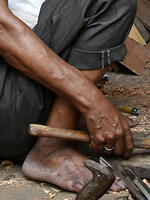
Wage inequality in India has declined over the past two decades. This article examines the role of rising minimum wages in driving this trend. Exploiting state-level variations in legislative minimum wage changes, it finds that minimum wage increases account for 26% of the decline in wage inequality...

– O ‘elevador social’ está avariado?
Um estudo recente fornece novas perspectivas sobre a mobilidade social intergeracional em Moçambique, com foco na educação e ocupação, bem como no bem-estar multidimensional e subjectivo. Esta análise acrescenta uma perspectiva importante às avaliações nacionais existentes sobre pobreza e bem-estar...
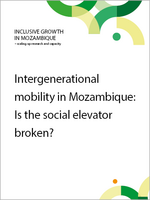
– Is the social elevator broken?
A recent study provides new insights into intergenerational social mobility in Mozambique, focusing on education and occupation, as well as multidimensional and subjective well-being. This adds an important perspective to existing national poverty and well-being assessments. While progress is found...

– Tendências, Desafios e Oportunidades
Este relatório analisa as tendências, desafios e oportunidades no sector agrícola de Moçambique entre 2002 e 2020, com especial enfoque na agricultura familiar. Baseia-se num conjunto de dados inovador, produzido no âmbito do programa Crescimento Inclusivo em Moçambique (IGM), que compila 11...

– Trends, challenges, and opportunities
This report examines the trends, challenges, and opportunities in Mozambique’s agricultural sector from 2002 to 2020, with a particular emphasis on smallholder farming. It is based on a novel dataset produced under the Inclusive growth in Mozambique (IGM) programme compiling 11 agricultural surveys...
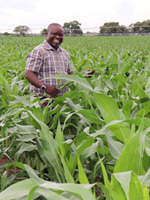
Agriculture has long been the backbone of Mozambique’s economy. Over 70% of the population relies on this sector for their livelihoods, contributing 23% to the nation's GDP. Despite its critical role, Mozambique faces significant challenges in boosting agricultural productivity to propel the economy...
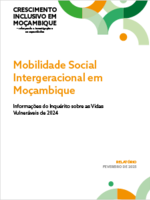
– Informações do Inquérito sobre as Vidas Vulneráveis de 2024
Este relatório resulta de uma análise da mobilidade social intergeracional em Moçambique utilizando dados recolhidos em seis postos administrativos de quatro províncias (Maputo, Zambézia, Sofala e Nampula) no âmbito do Inquérito às Vidas Vulneráveis (VLS).Este inquérito foi realizado no âmbito do...

– Insights from the Vulnerable Lives Survey 2024
This report is the result of an analysis of intergenerational social mobility in Mozambique using data collected from six administrative posts across four provinces (Maputo, Zambézia, Sofala, and Nampula) under the Vulnerable Lives Survey (VLS).This survey was implemented within the Inclusive Growth...
Displaying 48 of 8894 results
 Join the network
Join the network